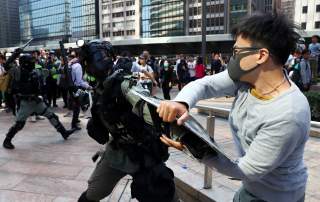China Needs Imperial Realism on Hong Kong
Hong Kong was declared in 1997 an autonomous “system” within China, but it was always more than that. A decade of threats from China since 2008 has driven the difference to grow further: from distinctive society into a distinctive nation.
China’s Options: Imperial Realism or Imperial Delusion
If China is realistic in the larger sense and evaluates its options by their likely consequences, then it will back off and accommodate Hong Kong as a distinctive society. It can still retain Hong Kong, but only by accepting the reality of what Hong Kong is.
China might however instead give in to the nationalist anger it has been whipping up against Hong Kong, letting that anger define what counts as realistic within its own discussions. In this case, it will end up with far worse consequences than anything it fears from compromise.
Would China think it rationally worth it? It would not be rational on the West’s to passively assume its own version of political rationality on China’s part. China has cultivated its own narrative for defining what it will count as rational.
China has learned little from the recurrent consequences of its aggressive moves in the last decade. These moves have been deductively rational steps within its narrative. It has moved from one to the next, ignoring the blowback, which has far exceeded its gains. It remains taken in by its narrative about its power, its rights, and what it can get away with.
All totalitarian regimes are victims in varying degrees of the delusion that Orwell called “reality control”—the feeling that their power and propaganda can reshape all realities as if to deny the independent existence of the external world.
Under Mao, China suffered terribly from this totalitarian delusion. Under Deng’s dictum, “seek truth from facts,” it made great progress toward authoritarianism and realism. Under Xi, it is falling back into totalitarian reveries.
For decades, Western passivity fueled Beijing’s feeling that it could wish away its obstacles. The recent pushback from the United States under Trump has begun to bring China back from fantasyland to a recognition of what Freud called “the reality principle”: the fact that external realities exist, and usually cannot be convinced to dissolve themselves.
This is what realism is about. It is the reason for being explicit about deterrence. It has brought China to engage for the first time in a serious negotiation to end its trade abuses. It will be a long way back, but the necessity will endure; the entire American political class has turned toward support of a tough line on China.
U.S. Policy Options
Trump’s overall approach has been in the range of Nixonian realism: maintain diplomatic politeness with the principals, but remind them that America has capabilities and can use them. He warned China that the trade deal could depend on resolving the Hong Kong situation peacefully, through dialogue and compromise. This was a real support for Western values.
However, perceptions are also a reality. Given the drumbeat of statements in the media about Trump failing to support Hong Kong, Beijing could perceive him that way, undermining his deterrent signals.
To prevent this, Trump could speak more often about the need for a peaceful resolution, maintaining Hong Kong’s freedoms and China’s international legal obligations on it.
As a further signal, Trump could sell Taiwan more armaments, upgrading its military deterrence. He will need to do this if he backs away from his linkage of the trade deal with a peaceful resolution in Hong Kong; or if China uses its military in Hong Kong.
Congresspersons could do less rhetorical grandstanding, and pass the laws Hongkongers want for bringing relevant pressures to bear on Beijing.
Western governments could get the UN to launch an independent investigation of police violence. It is one of the few things that could lead to a peaceful settlement: It could spur China, in order to retain some influence, into finally accepting a Hong Kong-run independent investigation. A member of Hong Kong’s Legislative Council has asked for this. China cannot stop the UN from doing it.
Ira Straus is Chair of the Center for War/Peace Studies, and U.S. Coordinator of the Committee on Eastern Europe and Russia in NATO; was Executive Director of the Association to Unite the Democracies during the Cold War, and has twice been a Fulbright professor of international relations in Moscow
Image: Reuters

